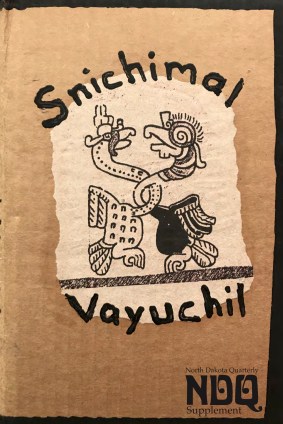Snichimal Vayuchil
Snichimal Vayuchil. North Dakota Quarterly Supplement 1.
Translated by Paul M. Worley.
Download Snichimal Vayuchil here.
Baja el documento Snichimal Vayuchil aquí.

Experimental Poetry in Bats’i K’op
Snichimal Vayuchil or Flowery Dream is an experimental poetry workshop in bats’i k’op, or Tsotsil Maya, where writers create poetry in their own mother language and Spanish, sharing their work as a form of what they call relational poetry. The workshop is also a place where these young writers reflect upon the origins of literature in indigenous communities, as well as the contributions contemporary indigenous literary creation makes to social change.
As a collective, here individual workshop members present two of their poems in English translation with the goal of reaching as wide an audience as possible. You’ll find a good deal of sonic diversity, Tsostil and its twin, Spanish (translated here into English of course!), and in some cases multiple languages are used for poetic composition. This bilingualism underscores the writers’ abilities and knowledge across languages. Composing in free verse, the poets express their daily lives, painting landscapes from the urban and rural imaginaries, to share their thoughts about land, family, love, pain, death, la lucha, resistance, and many other things to give a voice to those usually denied a voice, music to the deaf, in poetic composition! We hope you enjoy.
Experimento poético en Bats’i K’op
Snichimal Vayuchil o Sueño Florido es un taller experimental de poesía en bats’i k’op, lengua tsotsil, donde los escritores producen poesía en su propia lengua y en español, y que además se comparten en un espacio llamado poesía relacional. El taller Snichimal Vayuchil también es un espacio donde las personas pueden reflexionar sobre los orígenes de la literatura en los pueblos indígenas, así como de las creaciones contemporáneas de los pueblos indígenas y sus aportes a los procesos de cambio social.
En este trabajo encontraremos una diversidad sonora, que mezclándose entre la lengua tsotsil, y su par, el castellano, se juegan ambas para componer algunos versos, que muestra la habilidad al autor en el manejo y conocimiento de cada len- gua. Entre las formas de escribir, que son de formato libre, los autores expresan y comparten su cotidianeidad, pintando cada paisaje en el imaginario comunitario o citadino, sus sen- tires con la tierra, la familia, el amor, el dolor, las muertes, la lucha, la resistencia, y muchos otros elementos que buscan dar voz a los sin voz, y ¡a los sordos, poesía! Así, los compañeros del taller, ahora colectivo, presentan dos de sus creaciones para ser traducidas al inglés con la idea de ser publicados en una página en internet.
~
Music, voice, ceremony: our responsability of being people according the Popol Wuj. Snichimal Vayuchil resonates hundreds of years back. In offering flowery words to the ancient altars, Nezahualcoyotl’s songs resurge in the 21st century Maya youth. Closing the circle of pain and loss, this anthology is a celebration of the Maya creativity, and human resilience. Maltiox to the authors, editor, and translator. The elders in Palenque and Yaxchilan must grateful with these flowery dreams.
Juan G. Sánchez Martinez
UNC-Asheville
In a very special way this poetry collection is a collective poem: the book itself is already a poem comprised of many voices and three languages. Each writer presents her/his way of understanding the world to the world, having internalized the idea of writing as a way to dialogue with that world. Each poem is a verse that contributes to this collective work, the product of many hands, of many ways of thinking about the world. In this trilingual volume, writing becomes a weapon of multiple uses and its reach is amplified, demonstrating how there are different ways of writing and translating: innovating and embellishing how we read poetry.
Esta compilación poética, de una forma muy especial, da forma a un poema colectivo; el libro en sí ya es un poema, hecho con muchas voces, tres idiomas. Cada escritor/a exterioriza la forma de entender el mundo, no sin antes haber interiorizado la idea de escribir para dialogar con el mundo. Cada poema es un verso que contribuye a esta obra colectiva hecha a muchas manos, a muchas formas de pensar el mundo. En esta versión trilingüe, la escritura como arma de múltiples usos, amplía su potencial de alcance, demostrando que hay una forma diferente de escribir y traducir: innovando y embelleciendo nuestra forma de leer poesía.
Jorge Tapia
Universidad Autónoma de Queretaro
~
Paul Worley is an Associate Professor of Global Literature at Western Carolina University, and Editor-at-Large for Mexico at the journal of world literature in translation, Asymptote. He has forthcoming translations of the award winning indigenous poets Hubert Malina (Mé’pháá) and Martín Tonalmeyotl (Nahuátl). He published Telling and Being Told: Storytelling and Cultural Control in Contemporary Yucatec Maya, in 2013, and has recently published articles in A contracorriente, Studies in American Indian Literatures, and Latin American Caribbean Ethnic Studies. Stories recorded as part of his research on Maya literatures are available at tsikbalichmaya.org.
